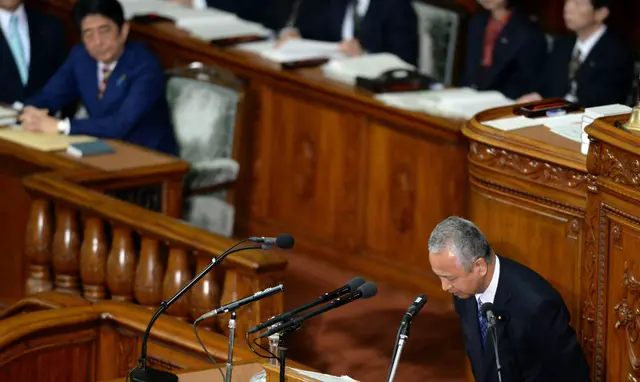Since Japanese Prime Minister Shinzo Abe's second term in office his cabinet has been plagued by funding scandals that have seen various ministers resign, with the latest this week involving his economics minister facing allegations he received bribes from a construction company.
With the damage that such scandals can cause to public faith and trust, and the erosion of support at the end of last year following the thwarting of the constitution to force illegal war bills into law, the prime minister is now keen to curry as much support as possible ahead of a key upper house election this summer.
The impetus for Abe to garner more public support, is all the more important in light of a number of political analysts and commentators believing he may also be eyeing dissolving the larger, more powerful lower house of Japan's bicameral parliament and call a double election, in the hope of winning a super-majority in both chambers.
Hence, it came as no surprise that the prime minister's policy speech to the ordinary Diet session Friday afternoon was an impassioned ramble about his lofty economic reform policies, some of which will see cash given to so-called low-income earners to "help boost consumption" and mechanisms to protect the nation's sensitive agricultural sector that faces a potential battering once the Trans-Pacific Partnership (TPP) deal reached recently takes effect.
"In actuality, the cash for low-income earners policy, will see one-off allocations given to the elderly; purportedly to help the nation's sluggish consumption," Kaoru Imori, commentator and political science research fellow, told Xinhua.
"But such provisions, as well as those being made for powerful lobbies that traditionally support ultra-conservative governments, it could be argued, are tantamount to backhanders to ensure support for the election in the summer," Imori proffered.
He went on to explain that what was really at stake, despite all the economic hyperbole in Abe's speech Friday, including the notion of equal pay for equal work, creating a dynamically engaged society, boosting welfare provisions and tackling demographic issues -- all of which sound wonderful in theory -- was the prime minister's ultimate desire to revise Japan's Constitution and strengthen his own grip on power.
Imori highlighted the fact that constitutional reform will require not just support in parliament, but a public referendum and, hence, it stands to reason that once again Abe is trumpeting the virtues of his latest installment of "Abenomics" to redirect the public's attention away from his unabashed plans to remilitarize the nation and increase its global military footprint, including in this region.
"We've seen it all before ahead of the passage of previous contentious legislation. Abe uses the promise of economic reform to galvanize support from the public and pushes ahead with his real goal of constitutional revision," said Imori.
"Along with ensuring more military autonomy, Abe is aiming to guarantee that following the election(s) his ruling coterie will be an autarchy of sorts that could, theoretically, operate without challenge or negotiation from its 'current' Komeito ally and even less so from the opposition camp."
It remains to be seen that when push finally comes to shove this summer, whether the population here will continue to go for Abe's elusive economic holy grail, or stand up for the peace and stability that has been intrinsic to culture and society here over the past seven decades.
 简体中文
简体中文

